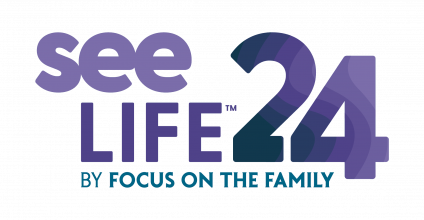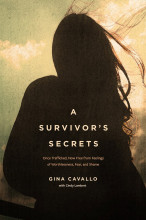John Fuller: I’m John Fuller. And on today’s Focus on the Family with Jim Daly, we’re gonna be sharing a powerful, dramatic story of one woman’s journey from human trafficking to a new life in Christ, and this content is not suitable for younger listeners. Uh, we recommend you direct their attention elsewhere.
Jean Marie Davis: The game is a Russian roulette game. So every day, you don’t know if you’re going to live to see the next day. It, it, it doesn’t… If you don’t make enough money, you don’t know how bad the pimp’s gonna beat you, right, or when I needed to, to get into a hotel room because I just wanted to lay down, the guy dropped all the bullets, picked up a bullet, put it into the revolver, spun it, and said, “Give me oral sex or I’m gonna kill you, if you wanna sleep in this bed.” And he started clicking it. And so, I had to do what I had to do. So, there’s, there’s those types of things. That’s why it’s called the game, because it’s a, it’s a chess game. It’s how can I get through the day without getting beat.
Jim Daly: Ah. John, that comment from our guest, Jean Marie Davis, is beyond belief. She’s describing a nightmare of violence, abuse, crime, and a total disregard for human life. It’s hard to comprehend the depths of such evil and sin in our world today. The National Human Trafficking Hotline website describes it this way. “Human trafficking is the business of stealing freedom for profit. In some cases, traffickers trick, defraud, or physically force victims into providing commercial sex. In others, victims are lied to, assaulted, threatened, or manipulated into working under inhuman, illegal, or otherwise unacceptable conditions. This is a multi-billion dollar criminal industry that denies freedom to 24.9 million people around the world.”
John: Mm-hmm. Those are startling, uh, observations, and tragically, Jim, there are people everywhere, even here in the U.S., um, but around the world, who are victims of some form of trafficking. And we pass by them on the streets. Most of us are totally oblivious to the pain and suffering they’re going through.
Jim: You know, John, I, I remember coming to grips with this. I was thinking it was all outside the U.S., Asia, Europe. But it is prevalent here in the U.S. And in part, that’s why we’re sharing Jean Davis’s story today. Um, sometimes in the Christian community, we’re tempted to shut and barricade the door to keep out the evils of our world. And yet, that’s not the mission that God has called us to as salt and light. I’m reminded of what Jesus says in Matthew 10:16. “Behold, I am sending you out as sheep in the midst of wolves. So be wise as serpents and innocent as doves.” And we need to be aware of evil and sin, and then look for ways to bring the gospel of Jesus Christ into that darkness. Thankfully, as we’ll hear today, that’s exactly what happened with Jean. Christians stepped in and gave her hope for a better future.
John: We recorded the following conversation in Houston, Texas at a small gathering of focus friends and donors who help support this ministry. And, uh, Jim, here’s how you began the conversation with Jean Davis on today’s episode of Focus on the Family.
Jim: You were sex trafficked for more than 20 years. What were the ages? And just explain the game.
Jean: Uh, so from age of two to the age of 29.
Jim: That is heart-wrenching.
Jean: Yes. Well, to some people. I, I don’t know. For me, I’m just gonna be honest ’cause I consider myself a overcomer, so, uh, Genesis 50 verse 20 says, “What was meant for evil, God turned for good to save many lives.” And a lot of people, they usually stop at that s- um, what meant, what was meant for, uh, evil, God turned for good, and then they stop. But you don’t capture the whole scripture unless you read it in its full context, and that last part says to save many lives. So, I am actually grateful that I went through what I went through so that other women can be saved. Uh…
Jim: Hm. Wow. I mean, that’s deep stuff. And I think as we move through the discussion tonight, um, it will become apparent, not easy. I mean, that’s… You make it sound now that it was not eas-
Jean: Just a breeze. Yeah. (laughs) Like it just… It, it was like-
Jim: It just happened.
Jean: It’s like a, a, a bad movie-
Jim: Hm.
Jean: … that I just lived.
Jim: But we gotta unfold it, so talk about your family origin, what were you experiencing, mom and dad, what were they like, what was going on in your life.
Jean: Um, so, uh, my parents have been married for almost 50 years.
Jim: Okay.
Jean: Um, but, my father had a lot of women come in and out. Um, I remember I was 16, and my mom and I walked in on him having sex with another woman, and my mom said, “Jean, go upstairs.” And then 20 minutes later, I hear my dad having sex with my mom and everything was fine and never talked about it after that. I was raised with football games, basketball games. So when the football came around, it was football parties, which meant me sitting on a lot of men’s laps and different things when I was two. So at the age of four, I got my first beer from my father. At the age of six, I got my first cigarette. By the age of 12, I was doing LSD, shrooms, and acid. Um-
Jim: At 12.
Jean: At 12. Um, and so, that was kind of my life. And then, including with the drug, um, and being, uh, raised in the bars, ’cause my parents, they would work and then they would leave me at home and stuff, so whoever was there, they would take me to the bars and, um, I would have to sit in these bars at the age of six, seven, uh, while they played darts or whatever, um, or I would walk in on two women having sex, or whatever, or people doing coke and stuff. And, uh, or I would be in my room, and family members would come in and they would do certain things to, uh, and molesting and stuff like that, or I would have my neighbors that were across the street, where the kids were… I would see their dad beating their mom, so the kids would run over to my house and hide in my house, or I would run over there and stuff if my family was getting into it and it was fighting. So that’s kind of my lifestyle that I lived.
Jim: So in that context though, we all grow up with that desire to be known and to be loved. So h- h- how do you find that in that environment?
Jean: So my dad used to call me fat, and I remember my mom telling me when I was, I think 14, um, because they were into the, uh, what is it, soul music and things like that, so The Temptations was one of their biggest groups, uh, that they loved. And I remember I told my mom I had a boyfriend and she goes, “Are you doing an imagination like The Temptations? Who would wanna be with you?” Right? Or, “Why would anybody wanna deal with you? You’re so fat.” My dad… And then I remember my dad said to me, I was 11, he said, “The only way that you’ll be married is if you’re in a pimp and hoe relationship.” Um, and then it got to the point where my dad at 16 just straight punched me in my chest and said, “Take it. You think you’re grown. I’m gonna beat you, and don’t cry.” And I stood there and took the punches, and that’s kind of… That was my life and stuff. So that was love. And that… It’s the grooming. So when I say that I was trafficked from the age of two to 29, when you read my book, I say I officially walked in it when I was 18. So from two to 18, I was groomed. I was prepared for it because my dad did so many things to me. So when he would hit me and things like that, I would take it as he loves me. So when my pimps beat me, I thought that they loved me. That’s what I got-
Jim: That was the language.
Jean: That was the language. That was the understanding.
Jim: Wow. Take us to that party, um, you know, and lightly describe-
Jean: Yep.
Jim: … that night. I guess you’re 18 and, and what happened?
Jean: Uh, so I was 18. I was working at a pizza place. And I remember the girl, she was actually, um… ‘Cause I was in a same-sex relationship. She was actually my girlfriend. And she said, um, “I’m gonna bring you to a party.” So we go to this party, and I walk in, and there’s half-naked women. There’s drugs being passed around. There’s money being passed. And I was like, “How do I make that? How do I get that money?” And so, they said, “Well, come on.” And there was three men that took me in the back, gave me some ecstasy pills and some weed, and then they gang raped me, and then this one guy said, “I choose you. You’re gonna go out and prostitute for me, or hoe for me.”
Jim: Wow.
Jean: And that’s how I walked into the human trafficking.
Jim: How much longer are you involved in this, in that moment, when you’re 18 going from the party? What was that like beyond that? I mean, h- just coping, eating, having a friendship. How did those things occur?
Jean: Right. So they, um, they had groups. So I would leave one. That, that’s where my story starts to become different because some women who’ve come out of it had only one or maybe two pimps, and I had multiple, because I would leave one and I would go to another one. And then this other guy would go, “Oh, I could do something better,” or, “Oh, I’ll do this,” and then I would leave. And then, it’s what’s called renegade, and a lot of people don’t understand that, that there are women that actually prostitute themselves. But they become more dangered in the fact that, when a pimp knows that they’re trafficking themselves, then they have more, uh, ability to make more money from her. And so, I got, um, sucked into it, uh, and guy flew me out. Next thing I know, I’m in a whole nother thing. And I got pimps that were in prisons that I had never met before, and I would get beat behind them, and all these things. So all this would happen. I would run and go to another state and get involved with somebody else. So that was the constant cycle. I would try to get my life together. It’s just like a person that’s an addict. They’ll try to get their life together and they would do good. They will come sober for like a month or six months or whatever. But then something happens. Right? And they would fall right back into it. And that was the same with me. I would get my life right. I would- I- I- had pimps that had me hooked on crack. Some put me on, uh, crystal meth. That was actually the choice of drug that I ended up and stayed on the longest, um, than all the other drugs. And I would sit there and I would go through all these things, and then, at… There’s a time where it just breaks and you just realize, like, what is going on. Like, my life is, is becoming meaningless. Like, I, I’m becoming useless and worthless and there’s nothing there.
Jim: How long was that, from turning 18 to starting to feel those thoughts?
Jean: Uh, 10 years.
Jim: About 10 years.
Jean: 10 years.
Jim: So you’re in that mess. E- You know, some have to be thinking to themselves that you can just walk away. So go a little deeper with us about that, as you said, like in a, you know, a drug abuse situation-
Jean: Yep.
Jim: … a drug addiction. I don’t think people see sexual addiction the same way, but it does work on the brain in very similar ways.
Jean: Yes.
Jim: So your inability to break out of that. I mean, you must have known it was harmful, it wasn’t good for you.
Jean: Right.
Jim: The environment wasn’t good. All those things could be true, but you still can’t find the way to break free.
Jean: Right. Because the way the, the relationship was with the pimps. So the difference between New England, uh, pimps and the rest of United States is the pimps hold the babies over the women. They force them to have children so that they can hold the babies over their head to make them, they’re going to make money. Whereas when you’re between New York down to California, the pimps, you’re just a product. So both of them, so my children, they were born out of that. So what happens is, I would have a pimp, and he would do things to where I didn’t want to leave him. But there would be drug deal, uh, drug dealers that would tell me, “Leave that pimp, leave that,” in- a- and I would think, “No, you want me to leave ’cause you want me to come to you.” No, no, no. I gotta stay. And then, or there would be the times, “Well if you leave me, I’m gonna kill you, or I’m gonna kill your, your family,” or I’m gonna do this. So they always weigh over the head of, if you leave me, you’re dead. And I’ve had, I’ve had that where I’ve had pimps that have called my family, who have called my friends, and have threatened that they were gonna kill them and kill me if they couldn’t find me and stuff like that. Most pimps won’t get their hands dirty. What they use, and who they use, is what they call a bottom, which is a woman who becomes the one that runs all the girls.
Jim: Kind of the police force.
Jean: Right. And runs the girls. So for me, because of the life that I lived and because how long I was involved in it, I was considered a madame, which is a woman pimp, so I trafficked women, and then I was also considered a bottom, which I was, um, which my pimp would bring a girl and say, “Okay, you, you, um, tell her what to do,” and all this stuff. “And, and you run her and you let me know, and you report back to me.” And then I was a renegade and then I was actually pimp. So there’s a whole different, uh, uh, level of-
Jim: There’s like a hierarchy.
Jean: Yeah.
Jim: That’s crazy.
Jean: Yeah.
Jim: Your, your mom and dad did step in at a time to at least extend some kind of help to you when you were desperate. Describe what happened there. What positive thing did they give you?
Jean: Oh. So there was a, a few things. I mean, uh, they did come rescue me at one time. Um-
Jim: And how old were you at that point?
Jean: Um, I was 19. That’s when I, uh-
Jim: Okay.
Jean: … was coming, just coming into it. Um, I was in a hotel room for about three weeks, and, um, I had, I had multiple, over 100 men, I think, in th- in that week, um, that I was there. And my pimps didn’t come. And I had no food. And so, I finally called my f- my family. And I’ll never forget. I was in the, a truck, and I was $400 short to give the quota to my pimp. And I remember, I sat there and had this argument with this man, and he’s like, “I could give you $40.” I was like, “No, I need $400.” And I’m in his truck, and I’m like panicking. And I’ll never forget that I looked at my phone, and my phone was on, and I picked it up and I go, “Hello? Hello? Hello?” And I didn’t realize. My family tells me, “Oh, you left a message. We heard the whole conversation.” And I go, “I never called you.”
Jim: Hm.
Jean: And so, that right there was something that they came and got me, and I hid out for about a y- year. I didn’t, I didn’t come… It was six, six and a half months I was stayed in their house, um, and then the next four or five months, that’s when they started slowly taking me out into the community-
Jim: Right.
Jean: … and stuff.
Jim: And i- about that point then, something unexpected happened and you met a charming young man.
Jean: (laughs)
Jim: But it’s-
Jean: Yes.
Jim: … the same old thing, right?
Jean: Yes.
Jim: So who is this, and what happened?
Jean: Uh, so, uh, (laughs) he, he was 26, I was 19, and I went… I was going to college. And he walked up, and how we met, it was very weird ’cause he was like, “Oh, you’re so beautiful.” And those words that were foreign to me, because my father never said those type of words to me, and he was like, “Oh, let me take you out to dinner. Let me do this.” And then, he said, “Come with me to a party.” And I said, “Okay.” And I went to this party, and there was all kinds of cars and everything. And then I walked in, and I go, “Oh. I actually am now being prostituted again. Like, I’m now having to”… He’s like, “Go get dressed and wear this and wear that, and now you gotta parade in front of these men.” And I had to do different acts to these men to prove to them that I was, uh, a good product, or I can make money basically for them.
Jim: And, I mean, what was inside of you to say, “I better leave this house?” There was nothing there to run, or did you feel that was too dangerous, or?
Jean: I was t- so for me, I’m a rebel. (laughs) I don’t… I just… I, I go against the grain, as they would say. So I was like, “I’m not doing this.” And so, I would, I would leave, and then he would come and, you know, bang and, “Oh, you’re not gonna leave.” And he would threaten. So we would go at it with each other, ’cause I’ve, I have fought some of my pimps. And because of that, they get shocked because a girl does not swing and does not retaliate when a m- a man attacks them. And so, it becomes an actual physical, oh, a man actually is stronger than women, and I realized that after I get my two little hits in and then I have to hide. So that’s usually what happens, but yeah. He… Him and I, uh, we went on for years. Uh, he, he told me he had a job and he had a car and he had this, and all these things that I, okay, you… And then I was like, “Oh.” And then he goes, “I’ll marry you. We’ll marry. I’m gonna marry you.” And then I come to find out that I’m baby mama number eight, and his 11th child, and he wants nothing to do with me.
John: That’s Jean Marie Davis, our guest on Focus on the Family, with Jim Daly. Jean is describing the nightmare world of sex trafficking that she experienced firsthand for more than 20 years. It is really hard to comprehend the evil and horror that she experienced. Looking for love that was denied her by her own family, and finding false love in the arms of men who only wanted to abuse her. If you can relate in any way to Jean’s story, feeling abandoned, abused, or just lost in a world where nobody cares, I urge you to contact Focus on the Family. We have caring Christian counselors who want to hear your story and pray with you and give you hope for better future. That’s why we’re here. Our number is 800, the letter A and the word FAMILY, 800-232-6459, or visit our website to find the help you need, focusonthefamily.com/broadcast. And now, more from this powerful conversation with Jean Marie Davis on today’s Focus on the Family with Jim Daly.
Jim: You describe in the book this idea of empty love.
Jean: Yes.
Jim: Describe it.
Jean: Oh… um, it is a false narrative. Um, it’s a false hope. It’s a false understanding.
Jim: What is it? Where do we end up on Empty Love Lane?
Jean: Y- by, at the end of the day, you, you end up when there’s nothing else. There’s no hope. There’s no, there’s no substance to it. And then, you, you’re scrambling. You’re like a hamster on a wheel, and you’re just starving. Um, I remember when I wrote that, and, and a lot of… I’m gonna be honest with you, a lot of the stuff that I wrote was in the middle of the night, and the Holy Spirit just dropped it down on me, and just said, “Here,” and just downloaded all these things. And when I did Empty Love, I, I didn’t even expect to do it, but it was because of the fact that that, at the end of my life where I wanted to commit suicide, I was so empty and depleted that I-
Jim: I can imagine.
Jean: … that I didn’t even have love for myself. Like for those years, I would draw, doll myself up and look all nice and everything like that to give that false hope of love for myself because, what most women who go into human trafficking is insecure because of something, of the way they look or whatever. And so, it was that… It was so, um, dark. It was almost like a, um… It was like mud.
Jim: Hm.
Jean: It, it was just like weighing you to where you just can’t feel anything. It’s almost like you’re numb walking through this Earth without a hope.
Jim: Yeah. I mean, in that context, I mean, what was that first drop of love you actually felt that was genuine?
Jean: Phyllis Phelps. (laughs) Phyllis Phelps.
Jim: Now take some time to think about this. (laughs)
Jean: (laughs) She probably gonna get mad at me, but that woman, I carry and sh- I carry her everywhere I go. She, she gets mad. She goes, “You can’t bring me with you.” I go, “Oh, I’m bringing you.” (laughs)
Jim: (laughs) Phyllis Phelps. Well, let’s get into that story.
Jean: Yeah. Uh, so 29, I was told by the police that, “You have four states to choose from, Washington, Alaska, Maine, and New Hampshire,” because all the other states, I was known in the streets. So they said, um, “For your safety, you gotta pick those four states.” And out of those four states, 27 shelters denied me because they said my situation was too severe. And so, I called. I was, uh, 6:00 California time, 9:00 New Hampshire time, and I’d just finished calling number 16. There were 16 shelters at the time in Maine, and they all said no. And I called number 17. Her name was Teresa, and she said, “Okay, I’ll take you.”
Jim: Mm-hmm.
Jean: And she said, “You gotta figure out a way to get out here.” And I had $1.38 in my name. And I said, “How am I gonna figure that out?” And so, next thing I know, I look up and, uh, the place that I was staying in, it was a safe house. Um, they said, “We don’t usually do this, but we’ll pay for your plane ticket. It’s a one-way plane ticket.” And it was a $500 plane ticket. I ended up in Manchester, New Hampshire. And they told me about a pregnancy center, and they said they believe in Jesus. I said, “Okay, well whatever.” E- If they can help, great. And through all that, I ended up at the doors of the pregnancy center, not realizing that they were the doors. And Teresa said, you know, “Phyllis, can you help this girl?” And I’ll never forget I walked into that center. (laughs) Man, and Phyllis looked at me. And I was about five months pregnant. And I sat down, and she said, “How can I help you?”
Jim: And that was the first ray of hope.
Jean: That was, that was the first ray.
Jim: Wow.
Jean: How can I help you? But it wasn’t just… It’s not just the words, “How can I help you?” There was something in her eyes that I wanted. When I looked at her, I knew she knew where I came from. And I just stared at her, and I said, “I want what you have. I don’t know what it is, but I want what you have.”
Jim: How did she respond?
Jean: She said, uh… Well, she… We went through the process of… Because I was abortion-minded and I was thinking of getting rid of my child, and she allowed me to hear the heartbeat. And when she convinced me to keep my son, I said, “Now what?” And the next word she said to me was, “I can’t help you, but I know a man named Jesus who can.”
John: Hm. I know a man named Jesus who can help you. What a wonderful turnaround experience for Jean Marie Davis, and she’s been sharing her dramatic life story with us today on Focus on the Family with Jim Daly. It really is unfortunate, Jim, that we had to stop right here (laughs) because this is really only the beginning of the incredible transformation and healing and restoration that God did in Jean’s life. Uh, so this is kind of a cliffhanger here, and, uh, we do hope that, as a listener, you’ll plan now to join us for part two of the conversation next time.
Jim: Uh, John, before we close today, I’d like to share a couple of observations about what we’ve heard thus far. Uh, first, isn’t it remarkable how no one is beyond God’s reach? I often say that. I mean, there were so many people, even members of her own family, who saw Jean as a lost cause. Uh, people dismissed her, abused her, and even threatened to kill her. But all along the way, God was protecting Jean and guiding her steps toward her ultimate rescue and salvation. And secondly, uh, Jean’s story points directly to the amazing impact that pregnancy resource centers, or PRCs, are having all over this nation. These centers are the front line of the pro-life movement, helping rescue preborn babies and helping their moms from abortion. Uh, Jean said it herself. She was abortion-minded and thinking of getting rid of her child until Phyllis showed her a better choice, a Godly choice. And as we’ll hear next time, that help went far beyond saving a baby. Uh, Jean was able to get off drugs, find a place to live, get a job, and so much more. And I despise that argument that those that support abortion say about the pro-life community. Uh, we do take care of the woman, and I’m done with debating that point. Uh, this is why Focus on the Family is working arm in arm with PRCs, so that together, we can rescue and save more families who are at risk. And one way we do that is through our Option Ultrasound program, where your giving helps equip pregnancy medical centers with training and machines so that they can provide free ultrasounds to women who are considering abortion. These women need to know about the precious life made in the image of God that they are carrying. And you can be part of that outreach here at Focus. Your gift of $60 will help save both a mother and her child from abortion. So help us, uh, by donating to Focus on the Family today.
John: And right now, through a matching opportunity, your giving to Focus will be doubled, which means your $60 gift becomes $120 and helps save even more lives. And Option Ultrasound is just one part of our overall See Life campaign this year that helps rescue pre-born babies and advocates for life in our culture and empowers friends like you to get involved with a PRC in your area. Learn more when you call 800, the letter A and the word FAMILY, or donate and find out details at focusonthefamily.com/broadcast. Also at the website, we do have information about See Life in mid-June. It’s an event here on campus, uh, at Focus on the Family. It’s a free, uh, in-person event, or live stream, and, uh, as we’ve said, you’ll find all the details online. Coming up tomorrow, we’ll share part two of Jean Davis’s incredible story about how God provided her with not only a new life and hope for a better future, but also a ministry to rescue women like she was from the streets. I’m John Fuller, and thanks for listening to Focus on the Family with Jim Daly. Join us next time as we once again help you and your family thrive in Christ.





















